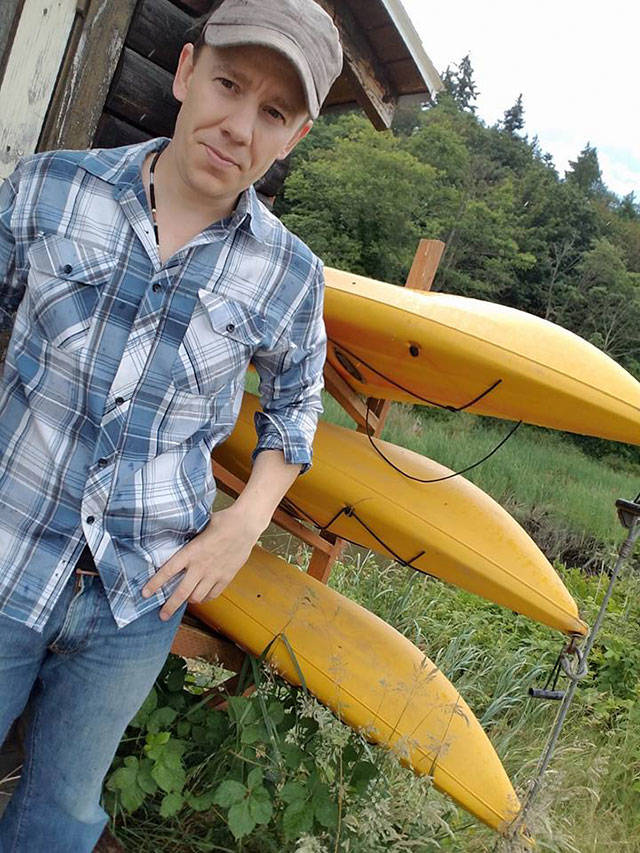Over the next several weeks, The Beachcomber will profile Vashon residents who have worked with refugees around the world. This is the first in the series.
Patrick Hurley remembers his longest trip to Thriftway. “I flew out of Iraq early in the morning and, before nightfall, because of the time change, I was sitting in the ferry line in my car, and then shopping at Thriftway.
“All in the same day. It’s not that far away,” Hurley said.
The world Hurley had left that morning may have been a long day’s distance, but could have been another world: A refugee camp for Kurdish Syrians fleeing the devastations of the Syrian civil war. There, Hurley said, nearly everyone knew people who had been killed, including family members.
Now living and raising his children on Vashon, Hurley still lives in both worlds. If he is not in the camp in Iraq, he is often in a Vashon cafe on his laptop, coordinating projects for the residents to build their own housing.
“I would be living and working abroad if I didn’t have children. I’m confined to Vashon,” Hurley said with a grin.
Nearly 20 years ago, Hurley was seeking a way out of his home state of North Dakota.
For his last year at the University of North Dakota, Hurley studied in Thailand “just to see something different.”
“It’s hard to explain how isolated I was, or unaware I was,” Hurley recalled.
Traveling to Bhutan, Hurley met a Bhutanese man who guided him to a refugee camp for South Bhutanese who had been forced to flee the country.
This experience led him not only to study human rights law in law school but to return multiple times to camps on the Thai-Myanmar border. Working for UNHCR, the UN Refugee Agency, Hurley was tasked with protecting the most vulnerable refugees who were escaping violence in Myanmar.
“In that setting, there are a lot of unaccompanied children. Their parents would send them to go live in the camps to be safe, go to school. But there was no infrastructure there to take care of them,” Hurley recalled.
The boys in the camp were at risk of being taken for forced enrollment as soldiers, Hurley said, while women and girls might be taken for sexual slavery. Even some of the European “volunteers” were likely predators, Hurley said.
The camps were often largely unplanned and uncared for, Hurley said. In helping to bring structure, he learned a lesson that still stays with him: the power of local control.
“When we ask them questions and they provide their solutions — they’re things we never would have thought of,” Hurley said.
Empowering refugees where they are is crucial to Hurley’s current work as program manager for Peace Winds America. This American offshoot of a Japanese organization cares for refugees and disaster victims around the world. Hurley’s current project is a camp for Syrian refugees in Iraq.
The Kurdish people live in a region that spans several nations, including Syria. Having fought both ISIS and the Syrian government, many Syrian Kurds were forced to flee into Kurdish regions of Iraq.
There, Hurley helps manage the project of helping the residents build their own housing, on a budget of about $20 a day. They are free to subcontract, even hiring locals from outside the camp.
Although the results are one-room cinder-block houses, the residents impart artistic touches of their own. The power of women’s voices plays a part.
“[The houses] have to comply with UN standards, but the women provided a lot of the ideas that we implemented, based on the actual function of the home once it’s built,” Hurley said.
Given the refugees’ status as Kurds in a Kurdish-controlled region of Iraq, the camp has a brighter future than that of many refugee camps. Hurley foresees a time when it is simply a town among others.
Even so, violence is nearby, both literally and figuratively.
Hurley had to endure a mock kidnapping in his first visit and only travels to the camp under armed protection.
“You’re so close to places you absolutely can’t go, or shouldn’t go,” Hurley said, mentioning Mosul as an off-limits city as near to the camp as Seattle is to Vashon.
The graciousness and hospitality of the refugees strikes Hurley, who said “you’re constantly invited to have tea and coffee, eating together, sharing food.”
But the residents carry the memory of experiences that Hurley described as “absolutely horrific.”
“The way people are tortured, killed in front of family members, the sexual slavery — I don’t get into that avenue. That’s too much to fully deal with.
“They’ve been through things that we can’t imagine. We can’t even hear stories of them. And they’re resilient. They’re incredibly resilient, and they’re strong,” Hurley said.
Even though much of his work is now remote, his on-the-ground experiences inform everything he does. He also said the reality of the life of refugees he has encountered stays with him wherever he goes.
“It puts my life into perspective. My problems, my issues. I’m going to be less frustrated by the ferry line or whatever happened in Thriftway or in traffic. In the grand scheme of things, it’s ridiculous,” Hurley said.
“I was able to go from there to here, with layovers, and arrive in the same day. We are incredibly close, but incredibly cut off. We’re not different, we care about the same things: our family, making a living, putting food on the table. We all just care about the same things.
“I view it from that perspective because I come from a conservative place. I’m friends on Facebook with people I grew up with, and they post the most horrible things about other countries and immigrants. I wouldn’t even repeat them. They’re truly awful. But I want to see that too,” Hurley said.
“We’re all the same. We’re all just human.”
— Andy James is a freelance writer.


